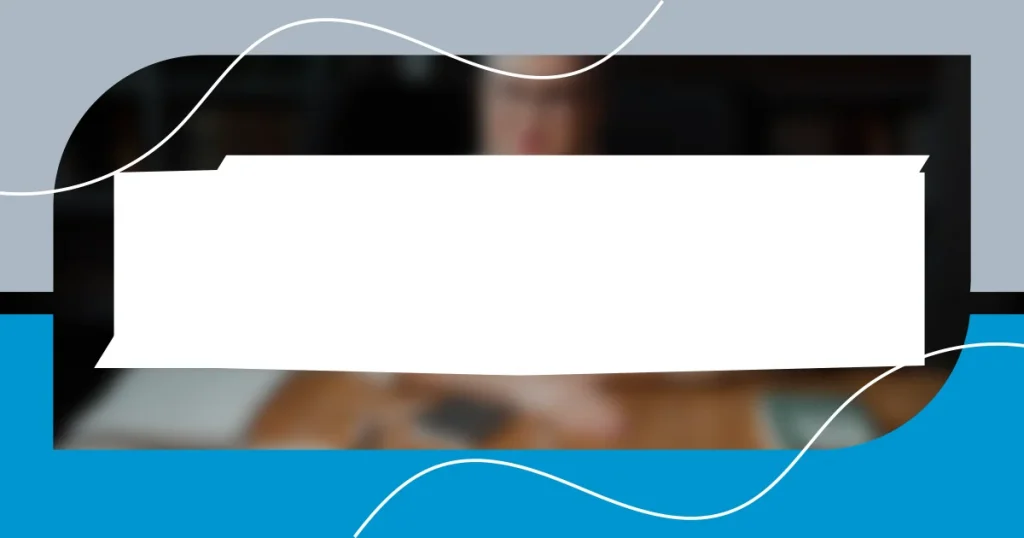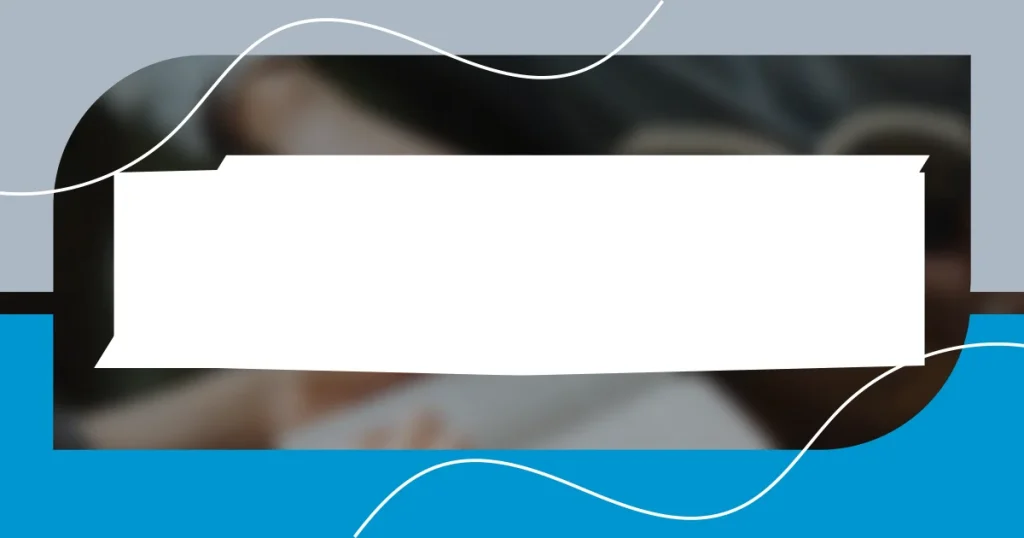Key takeaways:
- A literary agent is essential not just for selling manuscripts but for advocating for authors and guiding them through the publishing process.
- Preparing a manuscript requires meticulous proofreading, consistent formatting, and crafting a compelling query letter and synopsis to make a strong first impression.
- Effective communication with agents involves clarity, patience, and engagement, while evaluating feedback and offers requires balancing personal artistic vision with constructive criticism.

Understanding literary agents role
Literary agents serve as crucial intermediaries in the publishing world, connecting authors with publishers. From my own experience, I learned that a good agent doesn’t just sell your manuscript; they advocate for you, ensuring that your voice is heard and valued. Have you ever felt like no one understands your work? That’s where an agent’s insights can be transformative.
Agents sift through countless submissions, identifying the gems that might be overlooked. I remember the excitement I felt when my agent took the time to tweak my query letter. This small investment of time made a huge difference in how my manuscript was perceived. It highlighted for me how an agent’s expertise can turn a good pitch into one that stands out in a crowded market.
In addition to marketing your work, literary agents also offer vital guidance through the publishing maze. When I faced my first contract negotiation, I realized just how valuable my agent’s knowledge was. It’s not just about selling a book; it’s about building a sustainable career. Isn’t it comforting to know there’s someone looking out for your best interests in such a complex industry?

Preparing your manuscript for agents
Preparing your manuscript for submission to agents is a pivotal step in the publishing journey. I vividly recall the moment I received feedback on my manuscript; I didn’t just feel a mixture of excitement and anxiety, but I also understood the importance of polish. I spent countless hours refining my draft, ensuring it was not only free of errors but also flowed smoothly, like a well-prepared meal that invites you to take a bite.
Here are a few key tips to keep in mind while preparing:
- Proofread meticulously: Catching typos and grammatical mistakes can mean the difference between a good first impression and a rejection.
- Maintain a consistent format: Standard manuscript formatting (like double spacing and 12-point Times New Roman font) shows professionalism.
- Craft a compelling synopsis: This is often your first taste of storytelling for agents; make it engaging and reflective of your style.
- Compose a strong query letter: I remember agonizing over mine until I found just the right tone that represented me and my work.
- Include a brief author bio: Share relevant experiences or successes, as they lend credibility and show agents why you’re the right person to tell this story.

Researching potential literary agents
Researching potential literary agents can often feel like searching for a needle in a haystack. I learned that starting with a clear vision of what I wanted in an agent was essential. When I first began my search, I remember creating a list of agents who represented books in my genre. This concentrated focus allowed me to explore agents who shared my passion for similar themes and styles. Have you ever felt overwhelmed by the sheer volume of choices? I certainly did. Tailoring my search helped narrow down the options and made the process more manageable.
As I delved deeper into the research, I discovered that online resources and databases can be incredibly helpful. I often turned to websites like QueryTracker and Manuscript Wish List to gather insights into agents’ interests and current submission guidelines. The real turning point came when I stumbled upon interviews and articles where agents shared their preferences. I remember bookmarking these resources because they felt like uncovering hidden treasures. They offered me a glimpse into what makes an agent tick and taught me how to better align my work with their tastes.
Engaging with online writing communities also proved invaluable in my research. Hearing firsthand experiences from other writers painted a more nuanced picture of each agent’s reputation. I vividly recall someone sharing their positive experience with an agent known for being nurturing towards debut authors. This perspective reinforced the idea that everyone has different needs in an agent. Trusting those personal recommendations not only eased my anxiety but also spurred my excitement about finding the right match.
| Resource Type | Examples |
|---|---|
| Agency Websites | List of represented authors and submission guidelines |
| Online Databases | QueryTracker, Manuscript Wish List for agent preferences |
| Writing Communities | Forums and groups sharing experiences and recommendations |

Query letter essentials for success
When it comes to crafting a successful query letter, the opening sentence is your secret weapon. I remember the pressure I felt to hook an agent immediately, so I made it a priority to capture their attention right from the start. A strong opener not only piques curiosity but sets the tone for the entire letter. Ask yourself: what unique angle does your story offer that others might not? This can guide your opening lines into something memorable.
Clarity is essential in your query letter. I once sent out a query full of flowery language but received more crickets than interest. It taught me that agents are busy and appreciate concise, clear writing that gets straight to the point. I found that marrying brevity with an engaging narrative helped me convey the essence of my story without overwhelming the reader. Remember, if you can’t explain your book succinctly, how can an agent champion it to a publisher?
Also, don’t underestimate the power of personalization. I started tailoring each query to specific agents by referencing their previous works or preferences. This simple touch made my letters stand out and felt more genuine. There’s something rewarding about knowing you’re addressing an individual rather than a faceless entity. Reflecting on those experiences, I realized that agents not only want a compelling story; they also appreciate a writer who shows dedication and respect for their time and interests.

Navigating the submission process
Once you’ve honed your query letter, the next step is submitting it. I remember the mix of excitement and anxiety as I clicked “send” for the first time. It felt like tossing a message in a bottle into a vast ocean, wondering if it would ever reach the right shore. Have you ever questioned if you’re doing it right? I did, especially as I navigated differing submission guidelines that seemed to change like the wind. Finding an agent’s preferred method—whether by email or through an online portal—was like deciphering a secret code.
Then came the waiting game, which tested my patience in ways I never anticipated. I remember pacing my apartment, refreshing my email inbox endlessly, hoping for any sign of life. It made me acutely aware of the emotional rollercoaster involved in this process. To cope, I tried to immerse myself in writing and other projects, reminding myself that silence doesn’t necessarily mean a rejection. It’s important to recognize that agents often juggle numerous submissions, and a delayed response could simply be a sign they’re thoroughly considering your work.
Managing follow-ups also became a crucial part of my submission strategy. I learned that a polite nudge, just a few weeks after the standard response time, could demonstrate my earnestness without seeming pushy. In one memorable instance, my simple follow-up led to a request for additional material; that unexpected twist reinvigorated my hope. As I reflect on this stage of the journey, I realize that every aspect—from the submission to the follow-up—is part of a dance, requiring both grace and timing.

Communicating with literary agents
Effective communication with literary agents is pivotal, and I learned early on how crucial it is to be direct. I once crafted a query that dripped with excitement but clouded the central message. After some revisions, I focused on my story’s core, ensuring that I communicated its essence without getting lost in embellishments. How often do we overthink something when clarity is the real key?
When I received replies, I paid close attention to the tone and words used. Some agents responded with questions or feedback, which felt like an invitation to a deeper conversation. It’s fascinating—those moments taught me that communication isn’t just about sending a message; it’s about engaging in a dialogue. Have you ever felt that thrill when an agent shows genuine interest? Those exchanges became fuel for my motivation, reminding me that every message could lead to an invaluable connection.
I also discovered that timing and patience play significant roles in communication. There were moments, particularly during the waiting periods, when the silence weighed heavily on me. I can recall staring at my screen, heart racing every time an email pinged. Instead of festering in anxiety, I reminded myself that agents are often swamped with submissions, which gave me a new perspective. Finding that balance between anticipation and patience felt liberating, turning the process into an opportunity for growth rather than merely a test of endurance.

Evaluating agent feedback and offers
Evaluating feedback and offers from literary agents can be an enlightening experience. I vividly remember the mix of elation and confusion I felt when I received a response laden with constructive feedback. It felt like opening a door to a world of possibilities, but I often wondered—how do I decipher the agent’s intent? Was the critique meant to guide me or simply a soft rejection? Navigating these nuanced responses taught me that each piece of feedback is a valuable insight into the agent’s perspective.
When I finally received an offer, my heart raced. Yet, I found myself pausing to weigh the details thoughtfully. One agent praised my work but also had a distinct vision for my manuscript that diverged from my original intent. I remember grappling with the question: Should I adapt my story to fit someone else’s vision, or stay true to my creative instincts? This decision-making process isn’t just about an offer; it’s a reflection of how much you value your voice as an author and your willingness to collaborate.
It’s essential to approach offers and feedback with a balanced mindset. I learned to talk over choices with fellow writers and trusted friends, gaining insights that I might have missed. Their perspectives helped me sift through the noise, pinpointing what resonated with my artistic goals. How does one discern between genuine advice and mere subjective opinion? For me, it often boiled down to clarity—did the feedback resonate with the core of my story? Being open to critique while remaining anchored to my creative vision felt like walking a tightrope, but it ultimately led to deeper introspection about my writing journey.
















